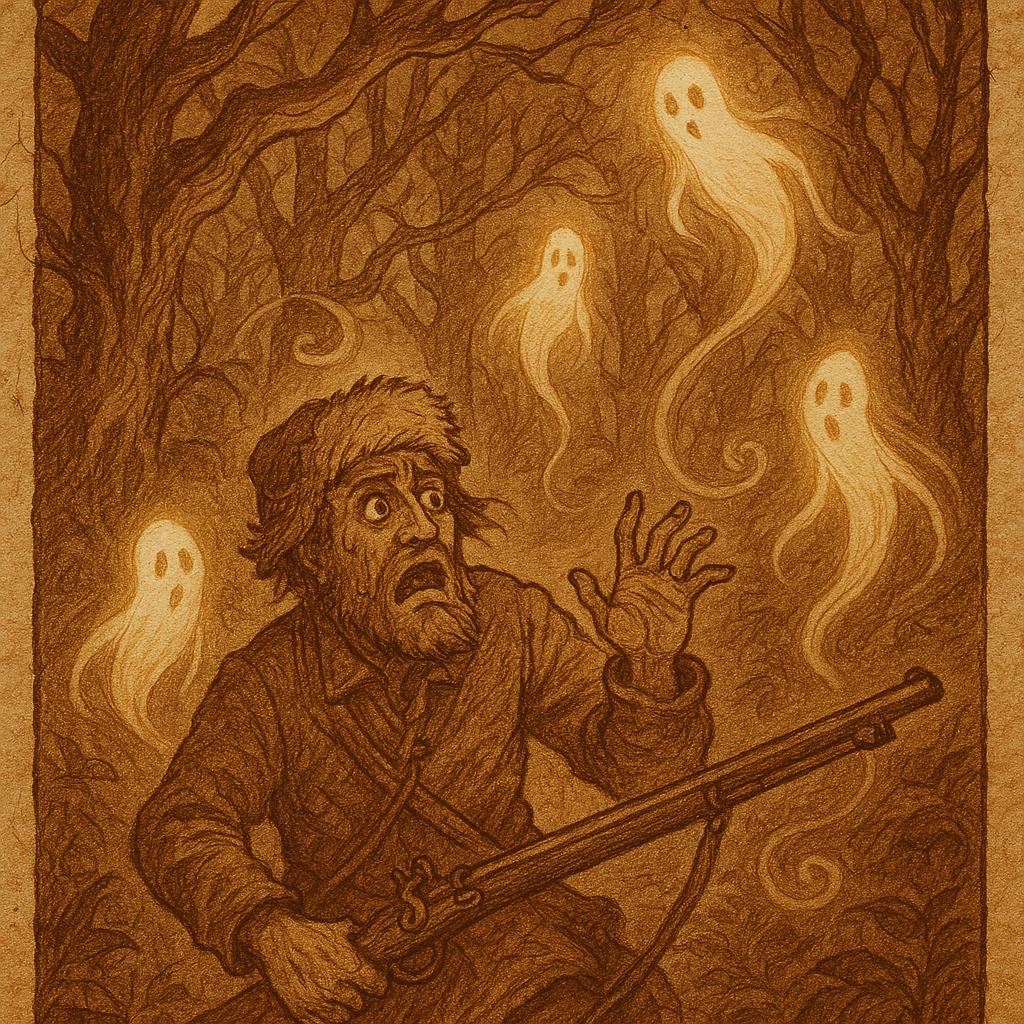Long ago, deep in the forests of Togo, there lived a skilled hunter. He knew every trail, every hidden grove, and every animal’s hiding place. His eyes were sharp, his hands steady, and his traps were clever. The villagers admired him for his skill and often praised his ability to bring food from the forest. But the hunter’s heart was not always guided by wisdom. Over time, he grew greedy. He began to kill more animals than his family needed, taking every opportunity to increase his wealth and reputation. He no longer paused to consider the sacred rules of the forest, the ancient laws that the spirits had set to protect the balance of life.
One bright morning, the hunter entered the forest earlier than usual. The birds chirped softly, and the sun filtered through the dense leaves, creating patterns of gold and green on the forest floor. He saw a herd of deer grazing peacefully and thought to himself, Today I will take more than ever. He set his traps and aimed his arrows without hesitation. By midday, he had captured more than he could carry. He smiled, proud of his skill and cunning. Yet, he did not see the small signs of warning around him. The rustling of leaves, the sudden silence of birds, and the gentle shifting of the wind were all signals from the forest spirits, but the hunter ignored them.
READ THIS: The Sacred Drum That Called the Ancestors
That evening, as he returned to his village, he felt a chill creep over him. The animals he had captured struggled strangely, and the shadows around the trees seemed to twist unnaturally. When he reached his hut, the air inside felt heavy, and a whisper echoed through the walls, reminding him of the forest’s rules. But the hunter brushed it aside, convinced that he had nothing to fear. The next day, he ventured into the forest again, greedier than before. This time, he hunted at dawn, taking even the young animals, showing no respect for the sacred balance.
Suddenly, the forest changed. The wind rose into a powerful gust, bending the trees as if they were alive. Strange sounds echoed through the woods: distant calls, rustling leaves, and low murmurs that seemed to come from the earth itself. The hunter froze in fear. Shadows moved unnaturally, and glowing eyes appeared in the darkness. The forest spirits had awakened. They were angered by the hunter’s greed and disobedience. A voice like rolling thunder spoke to him, reminding him that the forest was not his to take at will. Every animal, every tree, and every stream had its place, and by upsetting the balance, he endangered not only himself but the entire village.
The hunter dropped his weapons and fell to his knees. He begged for forgiveness, promising to follow the sacred rules and to respect the lives of the animals. The spirits listened but did not release their warning lightly. They created illusions to show the hunter what his greed had caused: rivers drying up, herds scattering, and the harmony of the forest unraveling. The hunter realized that his selfish actions could have destroyed the food sources for his own family and the village for years to come. With a heavy heart, he vowed never to hunt more than necessary again.
From that day, the hunter changed his ways. He taught others in the village to respect the forest, to take only what they needed, and to honor the spirits that protected the land. The forest responded with abundance once more. Animals returned to their grazing areas, the streams flowed freely, and the wind whispered gently through the trees as if acknowledging the restoration of balance. The story of the hunter spread throughout the region, serving as a reminder to all that greed and disregard for nature bring consequences, while respect and moderation preserve harmony and prosperity.
Moral Lesson: The story of the hunter who angered the forest spirits teaches that respect for nature and sacred traditions is essential. Greed and disregard for the balance of life lead to misfortune, while humility, careful action, and honoring the spirits ensure harmony and survival for all.
Knowledge Check
Why did the forest spirits become angry with the hunter?
Answer: The hunter ignored the sacred rules, killed more animals than necessary, and disrupted the balance of the forest, which angered the spirits.How did the forest show its displeasure to the hunter?
Answer: The wind rose, shadows moved strangely, glowing eyes appeared, and illusions showed him the harm his greed had caused.What lesson did the hunter learn from the spirits’ punishment?
Answer: He learned to respect the forest, take only what was needed, and honor the sacred rules to maintain harmony.How did the forest respond after the hunter changed his ways?
Answer: Animals returned, rivers flowed freely, and the forest regained its balance and abundance.What is the main theme of The Hunter Who Angered the Forest Spirits?
Answer: The main theme is that respect for nature and moderation are essential, while greed and disobedience bring consequences.How did the hunter help his village after learning his lesson?
Answer: He taught others to respect the forest, take only what was necessary, and honor the spirits to ensure the community’s survival.
Source: Kabye folktale, Togo. Oral tradition referenced in West African ethnographic collections (field recordings, 20th century).



